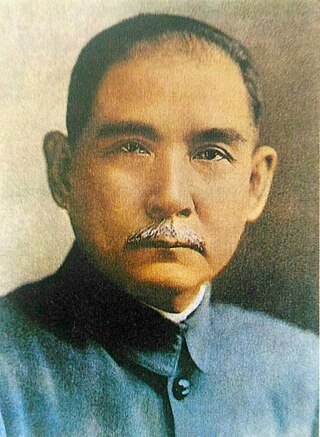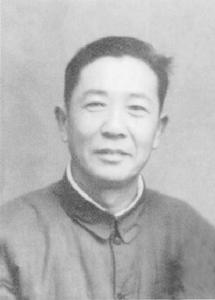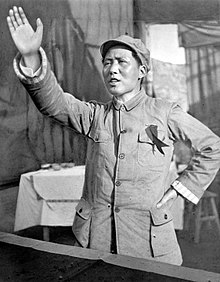Chinese historiography is the study of the techniques and sources used by historians to develop the recorded history of China.

The Three Principles of the People is a political philosophy developed by Sun Yat-sen as part of a philosophy to improve China made during the Republican Era. The three principles are often translated into and summarized as nationalism, democracy, and the livelihood of the people. This philosophy has been claimed as the cornerstone of the nation's policy as carried by the Kuomintang; the principles also appear in the first line of the national anthem of Taiwan.
Late capitalism, late-stage capitalism, or end-stage capitalism is a term first used in print by German economist Werner Sombart around the turn of the 20th century. In the late 2010s, the term began to be used in the United States and Canada to refer to corporate capitalism.
The Chinese New Left is a term used in the People's Republic of China to describe a diverse range of left-wing political philosophies that emerged in the 1990s that are critical of the economic reforms instituted under Deng Xiaoping, which emphasized policies of market liberalization and privatization to promote economic growth and modernization.
Marxism is a method of socioeconomic analysis that uses a materialist interpretation of historical development, better known as historical materialism, to understand class relations and social conflict and a dialectical perspective to view social transformation. It originates from the works of 19th-century German philosophers Karl Marx and Friedrich Engels. As Marxism has developed over time into various branches and schools of thought, no single, definitive Marxist theory exists. Marxism has had a profound impact in shaping the modern world, with various left-wing and far-left political movements taking inspiration from it in varying local contexts.

Imperialism: A Study (1902), by John A. Hobson, is a politico-economic discourse about the negative financial, economic, and moral aspects of imperialism as a nationalistic business enterprise. Hobson argues that capitalist business activity brought about imperialism.
Some economic historians use the term merchant capitalism, a term coined by the German sociologist and economist Werner Sombart in his "The Genesis of Modern Capitalism" in 1902, to refer to the earliest phase in the development of capitalism as an economic and social system. However, others argue that mercantilism, which has flourished widely in the world without the emergence of systems like modern capitalism, is not actually capitalist as such.

The Sinosphere, also known as the East Asian cultural sphere, or the Sinic world, encompasses multiple countries in East Asia and Southeast Asia that historically were heavily influenced by Chinese culture, norms and traditions. According to academic consensus, the Sinosphere comprises four entities: Greater China, Japan, Korea, and Vietnam. Other definitions may include Mongolia and Singapore, largely due to limited historical Chinese influences or increasing modern-day Chinese diaspora. The Sinosphere is not to be confused with Sinophone, which indicates countries where a Chinese-speaking population is dominant.
Anarchism in China was a strong intellectual force in the reform and revolutionary movements in the early 20th century. In the years before and just after the overthrow of the Qing dynasty Chinese anarchists insisted that a true revolution could not be political, replacing one government with another, but had to overthrow traditional culture and create new social practices, especially in the family. "Anarchism" was translated into Chinese as 無政府主義 literally, "the doctrine of no government."

The Great Divergence or European miracle is the socioeconomic shift in which the Western world overcame pre-modern growth constraints and emerged during the 19th century as the most powerful and wealthy world civilizations, eclipsing previously dominant or comparable civilizations from the Middle East and Asia such as the Ottoman Empire, Mughal India, Safavid Iran, Qing China and Tokugawa Japan, among others.
The actions by governments of communist states have been subject to criticism across the political spectrum. Communist party rule has been especially criticized by anti-communists and right-wing critics, but also by other socialists such as anarchists, trotskyists, democratic socialists, libertarian socialists and orthodox marxists. Ruling communist parties have also been challenged by domestic dissent. According to the critics, rule by communist parties has often led to totalitarianism, political repression, restrictions of human rights, poor economic performance, and cultural and artistic censorship.
Communism is a left-wing to far-left sociopolitical, philosophical, and economic ideology within the socialist movement, whose goal is the creation of a communist society, a socioeconomic order centered around common ownership of the means of production, distribution, and exchange that allocates products to everyone in the society based on need. A communist society would entail the absence of private property and social classes, and ultimately money and the state. Communists often seek a voluntary state of self-governance but disagree on the means to this end. This reflects a distinction between a more libertarian approach of communization, revolutionary spontaneity, and workers' self-management, and a more authoritarian vanguardist or communist party-driven approach through the development of a socialist state, followed by the withering away of the state. As one of the main ideologies on the political spectrum, communism is placed on the left-wing alongside socialism, and communist parties and movements have been described as radical left or far-left.

Arif Dirlik was a Turkish-American historian who published on historiography and political ideology in modern China, as well as issues in modernity, globalization, and post-colonial criticism. Dirlik received a BSc in Electrical Engineering at Robert College, Istanbul in 1964 and a PhD in History at the University of Rochester in 1973.
Proto-industrialization is the regional development, alongside commercial agriculture, of rural handicraft production for external markets. The term was introduced in the early 1970s by economic historians who argued that such developments in parts of Europe between the 16th and 19th centuries created the social and economic conditions that led to the Industrial Revolution. Later researchers suggested that similar conditions had arisen in other parts of the world.

The economy of East Asia comprises 1.6 billion people living in six different countries and regions. The region includes several of the world's largest and most prosperous economies: Japan, South Korea, China, Taiwan, Hong Kong, and Macau. It is home to some of the most economically dynamic places in the world, being the site of some of the world's most extended modern economic booms, including the Japanese economic miracle (1950–1990), Miracle on the Han River (1961–1996) in South Korea, the Taiwan miracle in Taiwan (1960–1996) and the Chinese economic miracle (1978–2015) in mainland China.
The Beijing Consensus or China Model, also known as the Chinese Economic Model, is the political and economic policies of the People's Republic of China (PRC) that began to be instituted by Deng Xiaoping after Mao Zedong's death in 1976. The policies are thought to have contributed to China's "economic miracle" and eightfold growth in gross national product over two decades. In 2004, the phrase "Beijing Consensus" was coined by Joshua Cooper Ramo to frame China's economic development model as an alternative—especially for developing countries—to the Washington Consensus of market-friendly policies promoted by the IMF, World Bank, and U.S. Treasury. In 2016, Ramo explained that the Beijing Consensus shows not that "every nation will follow China’s development model, but that it legitimizes the notion of particularity as opposed to the universality of a Washington model".
A comprador or compradore is a "person who acts as an agent for foreign organizations engaged in investment, trade, or economic or political exploitation". An example of a comprador would be a native manager for a European business house in East and South East Asia, and, by extension, social groups that play broadly similar roles in other parts of the world.
Socialism with Chinese characteristics is a set of political theories and policies of the Chinese Communist Party (CCP) that are seen by their proponents as representing Marxism–Leninism adapted to Chinese circumstances and specific time periods, consisting of Deng Xiaoping Theory, Three Represents, Scientific Outlook on Development, and Xi Jinping Thought. According to CCP doctrine, Xi Jinping Thought is considered to represent Marxist–Leninist policies suited for China's present condition while Deng Xiaoping Theory was considered relevant for the period when it was formulated.

Shang Yue was a Chinese Marxist economic historian, author and professor at the School of History at Renmin University of China. Before becoming a historian, he also wrote fiction. He taught literature to Kim Il Sung for a short time at Yuwen Middle School in Manchuria. In China, he is primarily known for his work on the idea of the sprouts of capitalism: that proto-capitalism and class struggle had existed in the earlier Chinese history. His purge in 1958 foreshadowed the Chinese Cultural Revolution as his ideas on Chinese economic history conflicted with those of Mao Zedong. After his purge he continued to work on history, but stayed out of public until Mao's death in 1976. His work also gave a lasting effect in Korean nationalist historiography.
Neoauthoritarianism, also known as Chinese Neoconservativism or New Conservatism since the 1990s, is a current of political thought within the People's Republic of China (PRC), and to some extent the Chinese Communist Party (CCP), that advocates a powerful state to facilitate market reforms. It may be described as classically conservative even if elaborated in self-proclaimed "Marxist" theorization.








